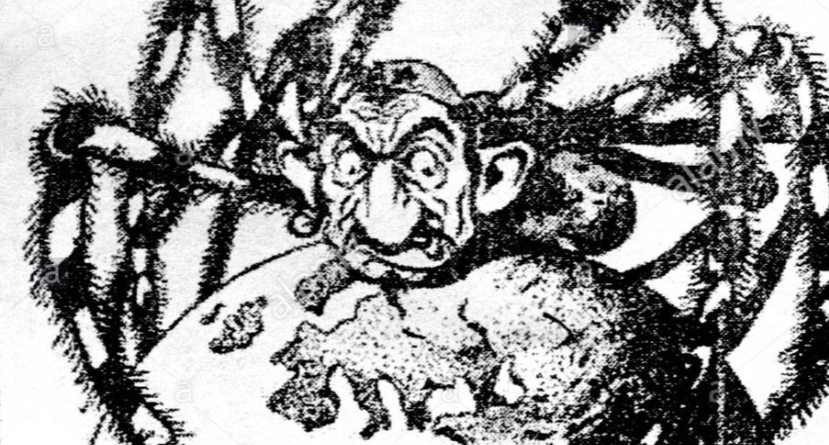Frei
Daily Stormer
August 11, 2019
Two recent news stories highlight how utterly the Jews have subjugated Christianity.
First, the Canadian Anglican Church has agreed to alter its liturgy to take out a prayer for the conversion of the Jews.
The “Prayer for the Conversion of the Jews,” among some 50 prayers in the Book of Common Prayer that are recited discretionally, beseeches God to “hasten the time when all Israel shall be saved,” and that his “ancient people…open their hearts that they may see and confess the Lord Jesus to be thy Son and their true Messiah.”
It will be replaced by a new prayer written (partly) by Jews.
The prayer “For reconciliation with the Jews” was a joint effort between the Anglican Church, the Prayer Book Society of Canada, and the Canadian Rabbinic Caucus, an affiliate of the Centre for Israel and Jewish Affairs.
The new Jew-written, Jew-approved prayer reads:
O God, who didst choose Israel to be thine inheritance: Have mercy upon us and forgive us for violence and wickedness against our brother Jacob; the arrogance of our hearts and minds hath deceived us, and shame hath covered our face. Take away all pride and prejudice in us, and grant that we, together with the people whom thou didst first make thine own, may attain to the fulness of redemption which thou hast promised; to the honour and glory of thy most holy Name.
The old prayer was innocuous but could be construed as an implicit reproach of Jews for failing to heed Jesus’ message; the new prayer is an explicit reproach of Christians for doing wrong to the Chosen.
The Jews are literally rewriting Christian prayers to praise themselves and instill a sense of shame and guilt in Christians about their own history and traditions!
Another recent illustration of how utterly the Jews have conquered Christianity comes from the Catholic Church, where campaigners have for some time been proposing the writer G. K. Chesterton as a candidate for canonization.
A British bishop asked to assess the proposal rejected it due to Chesterton’s occasionally critical remarks about Jews, saying “even allowing for the context of G K Chesterton’s time, the issue of antisemitism is a real obstacle, particularly at this time in the United Kingdom.”
In his Short History of England, Chesterton described medieval English Jews as the “capitalists of their age” and Edward I’s expulsion of them as the act of “a tender father of their people”.
In The New Jerusalem, he argued that Jews could never be loyal to the countries in which they lived, even suggesting they should wear distinctive dress.
Some extracts from Chesterton’s works are included at the end of this article. He had many interesting reflections on the Jews, some flattering and others unflattering. These are to be found especially in his book The New Jerusalem (1920), which is still worth reading as a snapshot of the way things were in the generation before Israel was formed. His remark about Jews being required to wear distinctive dress was nothing but a humorous fancy. Of course the Jews, with the cold disdain for the truth for which they known, bruit it about today as if it was meant seriously.
But it is an astonishing thing that the sensitivities of Jews now determine who gets to be a saint in the Catholic church. How many existing saints would fail to pass the “must have unequivocally positive views of Jews” test? How many of Christ’s apostles would pass it? Would Jesus himself? “Ye are of your father the Devil”.
How long before the Jews demand a purging of the rolls of all the good Christians who had “wrongthoughts” throughout history? Will we need to set up a Refugee Camp of the Saints for all the formerly revered unable to pass the Jew test?
In traditional Christian ideology, Jesus died in expiation of humanity’s sins, a martyr to the wickedness of the Jews who arranged his execution. Through their ceaseless barrage of Holocaust propaganda, the Jews have succeeded in inverting this core Christian idea and inserting themselves in Jesus’s place. In the new formulation, Jews died in expiation of humanity’s sins, a martyr to the wickedness of the Christians who arranged their execution. Auschwitz is the new Golgotha.
This strange, sinister (and, in Christian terms, heretical) idea has conquered the minds of even the most committed Christians, such that they now feel the need to alter their ancient liturgies to pay homage to the killers of Christ.
It is difficult to conceive of a mind conquest, a moral and spiritual usurpation, more complete than this. Bamboozled by Jewish sophistry, stirred by Jewish lies, afraid of Jewish power, those who call themselves the followers of Christ now beg forgiveness from his murderers.
From G.K.. Chesterton’s “Short History of England.”
It is pretty certain that he was never more truly a representative king, one might say a republican king, than in the fact that he expelled the Jews. The problem is so much misunderstood and mixed with notions of a stupid spite against a gifted and historic race as such, that we must pause for a paragraph upon it. The Jews in the Middle Ages were as powerful as they were unpopular. They were the capitalists of the age, the men with wealth banked ready for use. It is very tenable that in this way they were useful; it is certain that in this way they were used. It is also quite fair to say that in this way they were ill-used. The ill-usage was not indeed that suggested at random in romances, which mostly revolve on the one idea that their teeth were pulled out. Those who know this as a story about King John generally do not know the rather important fact that it was a story against King John. It is probably doubtful; it was only insisted on as exceptional; and it was, by that very insistence, obviously regarded as disreputable. But the real unfairness of the Jews’ position was deeper and more distressing to a sensitive and highly civilized people. They might reasonably say that Christian kings and nobles, and even Christian popes and bishops, used for Christian purposes (such as the Crusades and the cathedrals) the money that could only be accumulated in such mountains by a usury they inconsistently denounced as unchristian; and then, when worse times came, gave up the Jew to the fury of the poor, whom that useful usury had ruined. That was the real case for the Jew; and no doubt he really felt himself oppressed. Unfortunately it was the case for the Christians that they, with at least equal reason, felt him as the oppressor; and that mutual charge of tyranny is the Semitic trouble in all times. It is certain that in popular sentiment, this Anti-Semitism was not excused as uncharitableness, but simply regarded as charity. Chaucer puts his curse on Hebrew cruelty into the mouth of the soft-hearted prioress, who wept when she saw a mouse in a trap; and it was when Edward, breaking the rule by which the rulers had hitherto fostered their bankers’ wealth, flung the alien financiers out of the land, that his people probably saw him most plainly at once as a knight errant and a tender father of his people.
From G.K. Chesterton’s “The New Jerusalem”:
The Jewish problem can be stated very simply after all. It is normal for the nation to contain the family. With the Jews the family is generally divided among the nations. This may not appear to matter to those who do not believe in nations, those who really think there ought not to be any nations. But I literally fail to understand anybody who does believe in patriotism thinking that this state of affairs can be consistent with it. It is in its nature intolerable, from a national standpoint, that a man admittedly powerful in one nation should be bound to a man equally powerful in another nation, by ties more private and personal even than nationality. Even when the purpose is not any sort of treachery, the very position is a sort of treason. Given the passionately patriotic peoples of the west of Europe especially, the state of things cannot conceivably be satisfactory to a patriot. But least of all can it conceivably be satisfactory to a Jewish patriot; by which I do not mean a sham Englishman or a sham Frenchman, but a man who is sincerely patriotic for the historic and highly civilised nation of the Jews.
…
Patriotism is not merely dying for the nation. It is dying with the nation. It is regarding the fatherland not merely as a real resting-place like an inn, but as a final resting-place, like a house or even a grave. Even the most Jingo of the Jews do not feel like this about their adopted country; and I doubt if the most intelligent of the Jews would pretend that they did. Even if we can bring ourselves to believe that Disraeli lived for England, we cannot think that he would have died with her. If England had sunk in the Atlantic he would not have sunk with her, but easily floated over to America to stand for the Presidency. Even if we are profoundly convinced that Mr. Beit or Mr. Eckstein had patriotic tears in his eyes when he obtained a gold concession from Queen Victoria, we cannot believe that in her absence he would have refused a similar concession from the German Emperor. When the Jew in France or in England says he is a good patriot he only means that he is a good citizen, and he would put it more truly if he said he was a good exile. Sometimes indeed he is an abominably bad citizen, and a most exasperating and execrable exile, but I am not talking of that side of the case. I am assuming that a man like Disraeli did really make a romance of England, that a man like Dernburg did really make a romance of Germany, and it is still true that though it was a romance, they would not have allowed it to be a tragedy. They would have seen that the story had a happy ending, especially for themselves. These Jews would not have died with any Christian nation.



